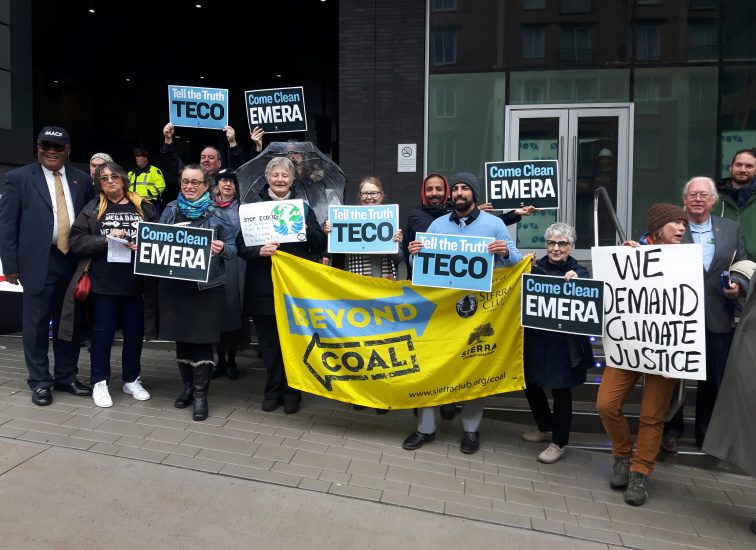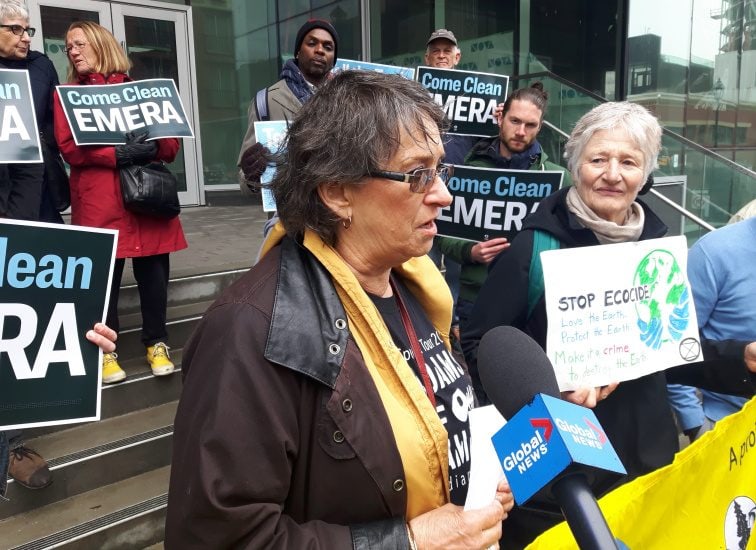KJIPUKTUK (Halifax) – This afternoon some 40 environmentalists, including folks` from Florida and Labrador, rallied at the new convention centre in Halifax to deliver a message of climate justice to Emera shareholders meeting inside.
The rally was organized by the Atlantic chapter of the Sierra Club and Extinction Rebellion Nova Scotia.

Among the demonstrators were some 10 people who had travelled all the way from Tampa, Florida to attend the rally on a cold and drizzly Nova Scotia spring day.
Tampa’s local energy company, TECO Energy is slow to move off fossil fuels. Since TECO is not listening the Floridians decided to send a message to Emera, which owns the Tampa company.

“We are here to convince Emera to tell TECO Energy not go use coal but use solar energy and stop using fossil fuels, either fracked natural gas or coal,” said Joe Robinson, second Vice President with the local Tampa chapter of the National Association for the Advancement of Colored People (NAACP).
“Environmental justice means that minorities and low income people who can’t defend themselves are the most impacted when climate change happens,” Robinson said. “When hurricanes destroy communities, like they do in Florida, they are the last people to get services restored, and get any funding.”
“TECO doesn’t want to meet with us, so we decided to come here,” said Gonzalo Valdes an organizer with the Florida chapter of the Sierra Club.
“TECO plans to keep us 90% reliant on fossil fuels until 2030, which is totally unacceptable, considering that Tampa is one of the US cities most susceptible to climate change, and rising sea levels. We face future storms much more dramatic than any storm we have ever seen,” Valdes said.
Meanwhile, the way TECO’s operations are structured will sound familiar to Nova Scotians.
“In the state of Florida the energy company is guaranteed an 11,5% rate of return on any project. Yet they are a public utility, it is a monopoly, and they are supposed to find the most cost effective solutions,” said Valdes.
“TECO also owns a company that makes money transporting the gas into Florida. It’s all about profits for their investors, and we are here to tell them that it can’t all be about investors, it has to be about the communities you serve,” Valdes said.
Muskrat Falls energy not clean, not green

Grand River keeper Roberta Benefiel, in town for the screening of People of a Feather, spoke about the extensive damage that the Muskrat Falls hydro project has inflicted on residents and Indigenous peoples of Labrador.
“There is nothing to suggest that Muskrat Falls will ever supply “clean” energy. Instead, we witness cultural genocide through the poisoning of local food sources for Inuit and Innu with methylmercury, a neurotoxin,” said Benefiel.
See also: The true cost of Muskrat Falls – methylmercury and environmental racism
Releases of greenhouse gases resulting from these giant reservoirs have not been studied properly, she added.
“Ever increasing costs of this project from $6,2 billion to $12.7 billion will be laid on future generations of the people of Newfoundland and Labrador, utility rates will rise, and Emera is complicit in allowing these issues to occur without questioning the effects of the project beyond the Maritime Link,” Benefiel said.
Meanwhile, Stephen Thomas of the Ecology Action Centre reminded the demonstrators that Emera’s Nova Scotia Power continues to rely on fossil fuels, in particular coal, here in Nova Scotia as well.
“Nova Scotia is the most coal-intense grid in Canada. 55% of our electricity comes from the burning of coal, Just last month the Nova Scotia government and Nova Scotia Power proposed to continue burning coal until 2042,” said Thomas.
“That’s way too late, even 2030 may be too late. We are living in a climate crisis, in the last moments we can take action before it is too late. Here in Nova Scotia that means phasing out coal,” Thomas said.
With a special thanks to our generous donors who make publication of the Nova Scotia Advocate possible.
Subscribe to the Nova Scotia Advocate weekly digest and never miss an article again. It’s free!



